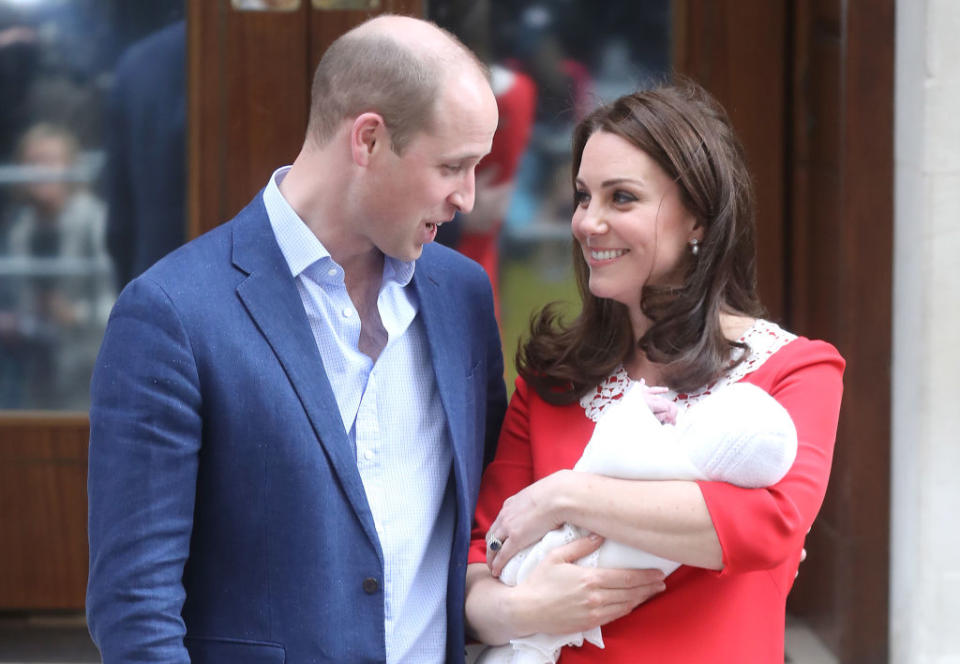Guests at Prince Louis's christening will eat 7-year-old cake. Is that even safe?
Big news for royal watchers: Prince Louis will be baptized today. Kensington Palace officials released details ahead of the big ceremony, including information on who will be there and what people will eat at the reception — and that’s where it gets interesting.
“Following the service, The Duke and Duchess of Cambridge will give a private tea at Clarence House,” a press release reads. “Guests will be served slices of christening cake, which is a tier taken from The Duke and Duchess of Cambridge’s wedding cake.”

For the record, Prince William and Kate Middleton got married in 2011, making this cake seven years old. That little detail didn’t go unnoticed by people on Twitter.
Announcement of Prince Louis' christening this afternoon. Er the guests will be fed some 7 year old wedding cake… is this normal? 🎂👑@euronews pic.twitter.com/iEzfNgucEe
— Vincent McAviney (@VinnyMcAv) July 9, 2018
It's a strange tradition we have. The top tier of the wedding cake is kept aside for any future christenings. Seven years is just when the parents were married – it would have tasted a bit fresher for the previous two.
— Robin Sones (@RMSones) July 9, 2018
Yummy. Seven year old cake. 🤢 https://t.co/rzuGOO2bQ2
— Gerald David James (@GeraldDJames) July 9, 2018
According to People, the cake that was served at the Cambridges’ wedding reception was a traditional eight-tier fruitcake — again, seven years ago. Gross factor aside … is that cake even safe to eat at this point?
There are definitely some risky factors at play, Darin Detwiler, PhD, director of the Regulatory Affairs of Food and Food Industries program at Northeastern University, tells Yahoo Lifestyle. The first concern is quality, he says: Food that’s been in the freezer this long has a pretty high chance of being freezer-burned.
Then there’s the fact that this cake was probably sitting out for a while at the wedding itself before being frozen — and that could allow bacteria to grow before it was even frozen, Detwiler points out. It seems like freezing something would kill off any pathogens that might be on the cake, but Detwiler says that some bacteria are pretty hearty and can withstand even years in the freezer. “We’ve seen salmonella prove us wrong in terms of how well it can survive,” he says.
The fats in the cake can also oxidize over time, whether they were frozen or not, Benjamin Chapman, PhD, an assistant professor and food safety extension specialist at North Carolina State University, tells Yahoo Lifestyle. “That could lead to rancidity,” he says.
And then there’s the defrosting process. Pathogens thrive in moisture and if the cake is defrosted in a way that could create more moisture like, say, it was left to sit out on a counter, the bacteria could proliferate during that time, Detwiler says. A safer option would be to move the cake from the freezer to a very cold refrigerator (one that’s colder than 40 degrees Fahrenheit) so that the cake defrosts slowly and doesn’t have a rapid exposure to moisture during that time, he adds.
While these are all things that can happen, it doesn’t mean that they will, especially if proper food safety regulations are followed. “If people can get past the taste of it, from a food safety standpoint it’s probably OK,” Chapman says.
Bottom line: This is a sweet idea — but it’s still pretty gross.
Read more from Yahoo Lifestyle:
No, Meghan Markle has not adopted a British accent — a linguist explains why
Meghan Markle and Prince Harry’s post-wedding thank you cards revealed
Follow us on Instagram, Facebook, and Twitter for nonstop inspiration delivered fresh to your feed, every day.
